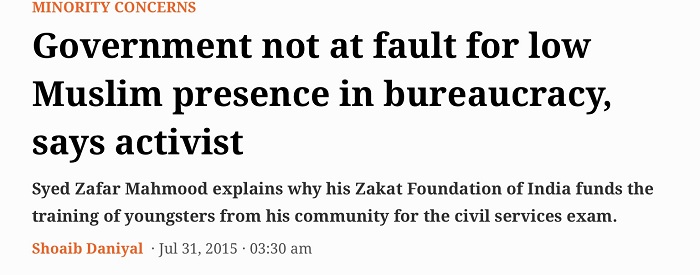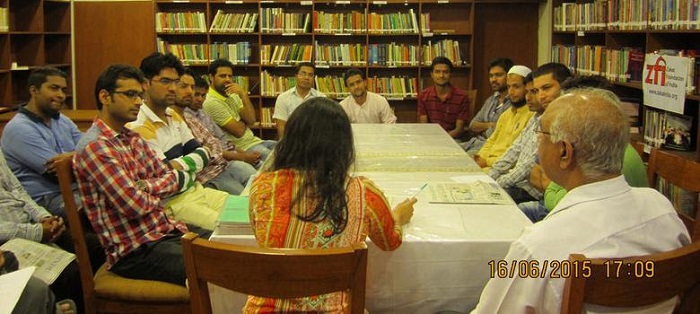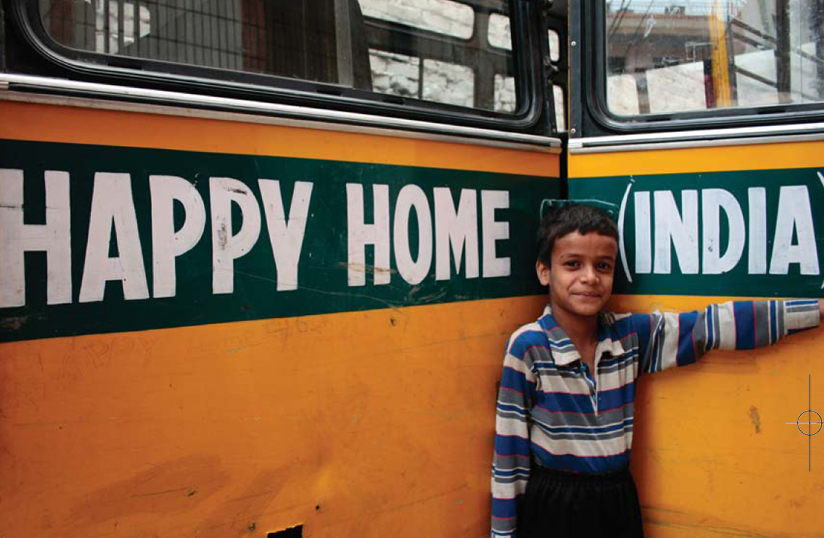|
FOLLOW  ON: ON:
  

|
 |

Government not at fault for low
Muslim presence in bureaucracy

Questions? Email info@zakatindia.org

Published in Scroll


While women seem to be
breaking gender barriers in the Union Public Service Commission exam,
Muslims still seem to be struggling. The 2015 results have four women in
the top five ranks, but out of 1,236 people who passed the exam this
year, only 38, or 3%, are Muslim.
Interestingly, almost half of the Muslim candidates who cleared the test
were sponsored by one body, the Delhi-based Zakat Foundation of India.
Syed Zafar Mahmood is the founder and president of the Foundation and
has earlier served on the Sachar Committee, appointed by the government
in 2005 to ascertain the socio-economic condition of Muslims in India.
Scroll.in spoke to Mahmood about the role of his organisation as well as
the larger issues of Muslim representation in India’s bureaucracies.
Tell us about the Zakat
Foundation of India and its role in preparing Muslims for the UPSC exam.
I took inspiration from what Sir Syed
Ahmad Khan did in 1887 – he started the Mohammedan Civil Services Fund
Association to finance the travel of Muslims to London to write the ICS
examination. The Zakat Foundation of India was established in 1997. In
2007 we started the unit that dealt with training people for the civil
services.
Muslim political representation, according to the population, is also
very low because constituencies with a large number of Muslims are
reserved for scheduled castes. The Sachar Committee had recommended that
this anomaly be referred to the delimitation commission. But the
government cannot be blamed for Muslim underrepresentation in the
bureaucracy. Sufficient numbers of Muslims are not appearing for the
civil services exams – not even 2,000 appeared for the UPSC exam this
year. Selfless and organised efforts need to be made by leaders of the
community and its well-wishers.
What are some of the backgrounds of the people who have made it using
the ZFI?
Muhammed Ali Shihab hails from Kerala. His father died when he was
eleven. The poor family made its living from a makeshift paan shop in
village Edavannappara, district Malappuram, where Shihab shared a small
dilapidated house with a brother and three sisters. His mother had no
means to feed the children. She took the children to a Muslim-managed
orphanage in Kozhikode district. Shihab completed his higher secondary
schooling and secured a teacher’s training certificate.
He wanted to study further but the pressure to make a living meant he
had to take up the first available job, which was of a peon in the
Kerala Water Authority in 2004. Later, he got promoted to lower
divisional clerk in a local body department. Shihab enrolled for a BA in
history as a private student even as he applied for other jobs. In 2007,
Shihab joined as an upper primary school teacher in Malappuram, where he
continued till he took a sabbatical to prepare for the UPSC exam.
He came to know of the civil services coaching conducted by Zakat
Foundation of India through a well-wisher. He appeared at the ZFI's
orientation-cum-selection procedure conducted in Mallapuram and was
selected by ZFI. The rest is history. He is now an additional collector
& district magistrate.
How do you collect and manage your funding? How much do you spend on
each student on an average? Is the student expected to repay back this
cost?
Out of Islam’s five basic pillars, zakat is the third. According to this
mandate each Muslim has to annually donate as charity 2.5% of his wealth
and annual savings in various forms including fixed deposits, shares,
land, properties, jewellery, etc. In addition, there is the sadaqah, an
optional means of charity extending to “all that is not needed by the
family”.
The Zakat Foundation of India is a registered trust and it undertakes
the organised collection and utilisation of zakat, sadaqah and other
charitable donations. Annually audited accounts available on the website
and statutory returns are regularly submitted.
We established the Sir Syed Coaching & Guidance Centre for Civil
Services in 2007. The most capable students are selected annually by the
ZFI via a written test and interview.
The ZFI admits these students to Delhi’s best civil services coaching
institutes. ZFI pays the high fees of Rs 1.5 to 2 lakh per person to
these institutes. Their board and lodging in Delhi is also taken care of
by us and students are accommodated in ZFI's civil services hostels in
New Delhi.
At the time of inducting ZFI Fellows, candidates need to sign a
declaration that the money that ZFI would spend on them will be treated
by them as a debt to be repaid either to ZFI or to god as and when they
are in a position to do that.
What made you start this initiative?
The Sachar Committee's findings and remedial measures that it suggested
were the starting point of our civil services support programme. I
apprehended that the government would not implement more than 10% of the
Sachar recommendations and that's what happened. Hence, the community
had to take its own initiative.
Muslims are severely underrepresented in our bureaucracy. Why?
There are many reasons for this. A shortage of information about the
process is one. There is also a lack of inspiration for aspirants, given
that there are no community role models and hardly any organised effort
on the part of the Muslim community.
What difference do you
think having more minority representation will make in governance in
general and minority welfare in particular?
It will promote the cause of inclusiveness. Muslims will start to
genuinely believe that they belong to the system as much as anybody
else.
A number of committees such as the Sachar, Mahmoodur Rahman and
Ranganath Misra have recommended reservations for Muslims in government
jobs. Do you think this is required? If so, what method of reservation
do you think will work?
The Constitution provides more than 15% reservation for scheduled castes
in the legislature, executive, judiciary and in educational
institutions. But it did not define the term “scheduled caste”, leaving
that to the wisdom of the executive. A 1950 government order listed,
statewise, all the so-called menial “professions” such as sweeper,
cobbler, barber, blacksmith etc. But in paragraph 3 of the covering note
it inserted a rider: “no person who professes a religion different from
the Hindu religion shall be deemed to be a member of a scheduled caste”.
Later, Sikhism and Budhism were added to this list, along with Hinduism.
The Supreme Court has agreed that this discrimination of the basis of
religion is unconstitutional and unjust. Justice Ranganath Misra said
that it is a black law. Hence, I feel that either there should be no
reservation for anybody or paragraph 3 of the 1950 order should be
deleted. In any case, the creamy layer should never be allowed to enjoy
the benefits of reservation. Nonetheless, each one of us needs to
seriously consider Iqbal's exhortation: Apni duniya aap paida kar agar
zindon mein hai. If you are truly full of life, give true meaning to it
by creating your own world.

Learn more about ZFI Fellowship Click here >
|
|
| |
ZFI selects and sponsors the coaching of a limited number of 'ZFI Fellows,' i.e. academically meritorious and financially deserving candidates with an interest in appearing for the highly competitive Civil Services examination conducted by the Union Public Service Commission of India.
The Civil Services offer about 1250 positions a year, out of a pool of
11,00,000 yearly candidates - i.e. 0.11% success rate.
Candidates are selected after an extensive application, test and interview process.
Candidates gain admission to premier coaching institutes of Delhi such as Vajiram, Synergy, Sri Ram, Ensemble, Interactions. Their fee is paid by ZFI directly to the institutes. They are provided
accommodation at ZFI's hostels.

Cost to support one ZFI Fellow for 1 competitive cycle is
more than INR 1,50,000/- (or US $3000/-). This includes tuition, housing and personal expenses.
Even smaller contribution from you would go a long way to supplement this effort.
|
|
|
|




